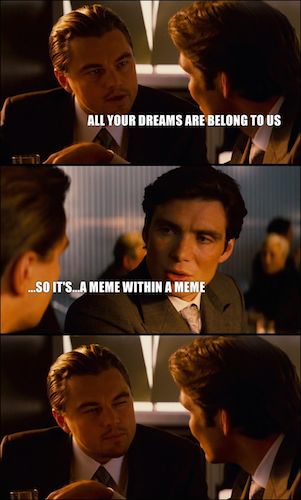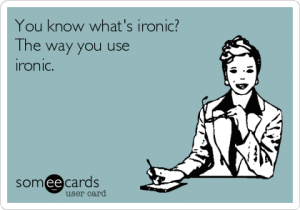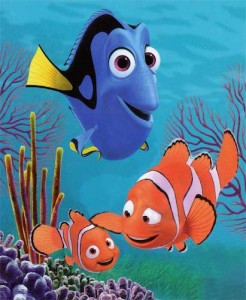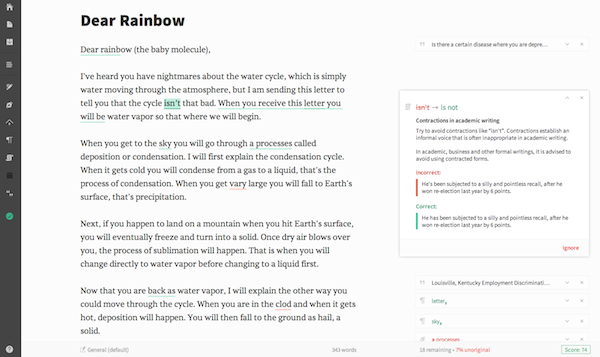by Naomi L. | April 29, 2015 | Blog, Creative Writing, Writer's Toolkit |
Remember that Grammarly quiz I shared last month in celebration of Grammar Day? Well, around the same time, the good people over at Grammarly offered me a free trial of their grammar checker as a gift for the occasion! Naturally, it was the perfect opportunity to try it out and write a review on it for my Writer’s Toolkit segment. After all, even the best writers need a little help checking their spelling and grammar, right?
So without further ado, here is my review of the Grammarly grammar checker. Enjoy!

About Grammarly
Grammarly, or the Grammarly®Editor, is a spelling and grammar checker that automatically proofreads text in English. According to the site’s product page, Grammarly “corrects contextual spelling mistakes, checks for more than 250 common grammar errors, enhances vocabulary usage, and suggests citations”. Aside from its primary function as a proofreader, the editor also features a thesaurus that suggests improvements on word choice and a plagiarism checker that compares text with over 8 billion pages on the Web.
Grammarly offers a few features for free, such as the quick grammar checker on their home page and the Google Chrome plugin that automatically checks any text you type in your browser. The full version can be accessed via premium subscriptions of $29.95/month, $59.95/quarter ($19.98/month), or $139.95/year ($11.66/month).
My free trial of Grammarly lasted for one month, during which time I used it to proofread my stories and blog posts. I also installed the Grammarly plugin on my Google Chrome browser, which for the purposes of this review is considered an extension of the full proofreader on the Grammarly website. Since I work on a Mac, I was not able to test the Microsoft Office add-in.
Pros
The first thing I noticed when I started using the Grammarly proofreader is that it doubles as a teacher. When the editor catches an error, it doesn’t just tell you that it’s wrong; it tells you why it’s wrong. This is immensely useful for learning about mistakes you didn’t even know you were making so you can avoid making them again. I’ve already learned a couple of grammar rules myself! Explanations include examples of correct and incorrect uses, and a fun little bonus is the score in the bottom right corner that evaluates how grammatically correct your text is overall. It’s like having your own private grammar tutor!
Another handy feature is the vocabulary enhancement thesaurus. The editor flags words it finds too common or repetitive and suggests replacements that may improve the quality of the text. It can also check a document against pages across the Internet to identify possible plagiarism, and while I confess that I only tested this a few times, it seems to work fairly well. Both of these features can be toggled on and off, which makes them optional additions to an already powerful proofreading tool. And yet another bonus is the preset configuration list for types of documents ranging from formal to creative writing, so you can actually teach the editor what sorts of errors you want it to focus on when proofreading your text!
The Google Chrome plugin also deserves an honorable mention, as it brings all of Grammarly’s features to any web page on which you write. When you type into a text box, an icon appears in the corner and automatically updates a number to indicate how many errors are being detected as you type. Hovering over this icon will open a small tab that shows you how many advanced and critical errors are in your text at the moment, and clicking in this tab or on the explanations that appear when you hover over underlined errors will open the Grammarly editor directly on the page, so you can edit your text without having to navigate away. It even seems to learn your writing style the longer you use it. That’s pretty neat!
Cons
It’s worth noting at this point that the gentleman who set me up with my free trial of Grammarly mentioned its usefulness as more of a “second set of eyes” as opposed to a replacement for a professional proofreader. After trying it out a few times, I quickly realized what he meant. The proofreader points out whatever it believes may be an error, but it can’t always take the full context of the document into account. Sometimes it incorrectly marks an alternative grammar choice as an error, and other times it misreads the context and lets a mistake slide. This issue was already thoroughly covered in a review by Grammarist, so I won’t go into detail here. In all fairness, that article was written over three years ago, during which time Grammarly does seem to have improved on its shortcomings, but it still can’t fully compensate for the judgment of a human being. Grammarly is good for catching errors you missed yourself, but if you need to proofread a whole book, your best bet is to hire an editor.
Perhaps the biggest drawback I noticed while testing Grammarly is that it isn’t entirely relevant to my style of writing. This isn’t necessarily a con, per se; more of an observation of how the editor seems to be specifically geared toward strictly formal composition. Most of the documents I pasted into Grammarly were short stories, and while the proofreader was right to catch many of my supposed errors (even when set to “Creative – Short Story”), over 90% of them were left untouched due to being creative choices on my part as opposed to actual mistakes (e.g. character dialogue or first-person narrative intended to sound “real”). Perhaps this is more of a testament to the perfectionist editor in me than to Grammarly’s limited usefulness, but I still think it’s worth mentioning for the benefit of writers as meticulous about grammar as me. If you know exactly what mistakes you’re making, you don’t need to pay for an automatic proofreader to tell you the same thing.
I should also mention that I do much of my writing on an iPad, and though I was able to use Grammarly well on my laptop, I couldn’t access it at all through my mobile device due to incompatibility issues. I can’t say if the editor works on non-iOS devices because I don’t own one, so this is mostly a note of caution to Apple users, but it may apply to anyone who frequently writes on a smartphone or tablet. Until Grammarly comes out with a mobile app, you’ll have to make due with your device’s built-in spell checker.
Summary
Pros
- Grammatical error corrections with explanations
- More thorough than standard word processor spelling and grammar checkers
- Built-in thesaurus for vocabulary enhancement
- Plagiarism checker
- Settings for different types of documents
- Google Chrome plugin for universal use
Cons
- More useful for formal writing than creative writing
- Misses some grammatical errors
- Incorrectly marks some alternative grammar choices as mistakes
- Incompatible with mobile devices
Conclusion
Is Grammarly worth your money? I’d say that depends on three factors: what you write, how often you write, and how proficient you are at editing on your own. If you’re constantly typing up formal documents, articles and emails that require impeccable spelling and grammar, a premium subscription to Grammarly may be just what you need. If, however, most of your writing consists of poetry or stories that experiment heavily with form and style, then a standard free grammar checker may suffice. Use your discretion when deciding how much help you really need to edit your work.
Based on my brief experience with it, Grammarly certainly seems to warrant the respect it gets, and though I may not need it now while my writing is concentrated in the experimental short story format, I may consider attaining a full subscription for future proofreading of my novels and academic papers (both of which are included in the aforementioned preset list). In any case, Grammarly has certainly gained this writer’s attention, and I believe it deserves the attention of any writer looking for a better automated editor than what the standard word processor has to offer. To paraphrase the famous proverb, your grammar is only as strong as your weakest misplaced comma.
Bonus: I used Grammarly to proofread the first draft of this blog post. Before editing and after including vocabulary and plagiarism checking, it came out to 35 critical issues and a score of 91 out of 100. Thanks, Grammarly!
Today’s creative writing post is brought to you by Grammarly, the World’s Best Grammar Checker. I was not compensated for this review. All opinions expressed here are my own. For more information on Grammarly, visit http://www.grammarly.com/grammar-check. Thanks for reading! Happy writing!
by Naomi L. | March 11, 2015 | Blog, Creative Writing |
Ready to celebrate National Grammar Day? Then you’d better hop in a time machine and jump back to last week, because it was March 4th. Sorry! Being the total ditz/busy grad student that I am, I neglected to mark the date on my calendar and completely missed my chance to kick off Grammar Day on my blog. That’s OK, though, because every day is a good day to appreciate grammar!
To mark the occasion, the good folks over at Grammarly have created a quiz to help you determine what kind of grammar nerd you are. Take the quiz and share your result in the comments below!

And while you’re at it, why not take a moment to try out their grammar checker? It’s quick, highly accurate, and best of all, free! Prolific writers, take note: you can also subscribe to a premium account on Grammarly.com for as low as $11.66 a month to gain full access to a spelling and grammar checker ten times more powerful than your word processor!
So what are you waiting for? Proofread your texts with Grammarly and start celebrating proper use of grammar today! Happy Grammar Day!
Oh, and in case you’re wondering, I’m a Pedant’s Grammarian. No surprises there!

Today’s creative writing post is brought to you by Grammarly, the World’s Best Grammar Checker. All opinions expressed in this article are my own. For more information on Grammarly, visit http://www.grammarly.com/grammar-check. Thanks for reading! Happy writing!
by Naomi L. | January 21, 2015 | Blog, Creative Writing |
I’ve already talked about words that people use incorrectly and words that used to have another definition. But what about those word meanings that are just plain wrong? Continuing on the topic of grammar pitfalls, here’s a new post focusing on words that people seem to think mean one thing but that really mean something totally different. To keep things light, I’m starting with four of my favorites, but please feel free to suggest more in the comments! Thanks, and enjoy!
Please note: accounts behind the words listed here are based entirely on personal experience and may not accurately reflect the majority of people’s understanding. The definitions, on the other hand, are correct to the best of my (and the Oxford Dictionaries editors’) knowledge. Read consciously! Thank you!
Inception means “beginning”, not “a dream within a dream”

Memeception?
Shortly after Inception came out in 2010, the Internet was flooded with jokes and memes based on the blockbuster sci-fi film, from captioned dialogues between Leonardo DiCaprio and Cillian Murphy to videos containing the trailer’s infamous “BRAAAM“. One of the most common jokes I’ve heard is to add the suffix -ception to any word to indicate that said thing is contained within another of the same thing (e.g. Jokeception = a joke within a joke). Apparently, the idea of multilayered dreams is such a prominent theme in the film that many believe it to be the major point of the plot. And while it isn’t fair to assume that all or even most people who use this meme don’t know what “inception” really means, there’s always that minority who aren’t even aware there’s a mistake until it’s pointed out to them.
So those of you who count yourselves among this group, take note: “inception” indicates the beginning of something, not a dream with a dream (or any X within an X, for that matter). Feel free to make all the jokes you want, but don’t let the memes confuse you!
Note: in case you were wondering, the actual word for “a thing within a thing” is “recursion”. The title of the movie is Inception because the main characters’ goal is to trigger the birth of an idea within someone’s mind. You’re welcome.
Star-crossed means “ill-fated”, not “soulmates”
When one hears the term “star-crossed”, the first idea to come to mind is most likely William Shakespeare’s Romeo & Juliet. This is to be expected; it is, after all, the play that originated the trope:
From forth the fatal loins of these two foes,
A pair of star cross’d lovers take their life,
Whose misadventur’d piteous overthrows
Doth with their death bury their parents’ strife.
(I.Prologue.5-8)
To anyone even remotely familiar with this story, it should be obvious from the opening sonnet that “star-crossed lovers” are those who struggle against fate. Romeo and Juliet do everything they can to live happily together, yet circumstances and bad luck lead them to a tragic end instead. However, some people seem to misinterpret “star-crossed” as having the opposite meaning, that is, a term for lovers who are destined to be together. It’s an understandable mistake, since hardly anyone can argue against the idea that the eponymous lovers are at least supposed to be together, but that doesn’t make it any less incorrect.
For future reference, “star-crossed” refers to a relationship doomed to be thwarted by external forces. Evidently coined by Shakespeare himself, the term stems from the old belief that the stars controlled fate, and thus the “crossing” of two people’s stars indicated misfortune in their path. Therefore, it should never be used to indicate that two people are soulmates, as it means just the opposite. Be careful!
Wherefore means “why”, not “where”
While we’re on the subject of Romeo & Juliet, here’s a word that everyone has misread at least once. The most famous line in the play comes up during Juliet’s balcony monologue, when Romeo eavesdrops on her musing, “O Romeo, Romeo! Wherefore art thou Romeo?” (II.ii.33)
For modern-day readers, it’s natural to read “wherefore” as a fancy “where”, and to assume that Juliet is wondering where her beloved Romeo has gone after the Capulet ball. However, “wherefore” actually comes from a Middle English phrase meaning “what for”, and should thus be read as “why”. This, of course, changes the entire meaning of the above line. Juliet is really saying “Why are you Romeo?”, as in she is lamenting the fact that he is a Montague. It may not mean what you thought it did, but the true definition of “wherefore” makes this line much more poetic, don’t you think?
Decimate means “reduce”, not “obliterate”
While it isn’t a common mistake, I’m almost certain I’ve heard someone use the word “decimate” incorrectly before, probably in a phrase along the lines of “completely decimated”. This is actually something of an oxymoron, as “decimate” refers to the destruction of a percentage of something, not the entire thing. Perhaps this incorrect use was simply a rare example, but just in case, it’s worth clearing up for future reference.
Historically, to “decimate” was to kill one in every ten of a group of people (generally soldiers) as punishment for the entire group. Nowadays, it usually means to destroy a large portion of something, but the historical evidence is still there in the Latin root deci-, which means “tenth”. In any case, it’s generally agreed that the word should not be used to mean “defeat utterly”, so take care with how you use it yourself!
Have you been reading any of these words incorrectly? What other words would you add to this list?
by Naomi L. | November 26, 2014 | Blog, Creative Writing |
Remember those four words I once mentioned that people sometimes use incorrectly? Well, today’s post briefly continues on that topic to discuss four words that originally meant something different from the definitions many people use today. If you can think of more words that fit this category, please feel free to share. I’d love to write about them in the future! Thanks, and enjoy!
Egregious meant “outstanding” before it meant “horrendous”
“Egregious” was the second Word of the Week I ever shared on my blog, and I still think it’s as fun to say now as it was back then. Interestingly, this word used to mean something positive before sarcasm turned it into something negative. The original definition of “egregious” was “remarkably good”, while today it means “shockingly bad”. It’s likely this newer derogatory sense from the late 16th century arose as a twist of irony. Speaking of which…
Ironic meant “paradoxical” before it meant “sarcastic”
 I know I’ve already mentioned this word before, but it’s worth bringing up again here. Many people seem to think that “ironic” is synonymous to “sarcastic”, but while this use is widely accepted nowadays, that wasn’t always the case. An “ironic” event is when something happens that’s the opposite of what would be expected, often to a humorous effect. There’s no harm in pointing out the irony in your life, of course, as long as you understand what it is!
I know I’ve already mentioned this word before, but it’s worth bringing up again here. Many people seem to think that “ironic” is synonymous to “sarcastic”, but while this use is widely accepted nowadays, that wasn’t always the case. An “ironic” event is when something happens that’s the opposite of what would be expected, often to a humorous effect. There’s no harm in pointing out the irony in your life, of course, as long as you understand what it is!
Peruse meant “scrutinize” before it meant “scan”
“Peruse” is another word I’ve written about before in my vocabulary segment. What caught my attention about it was the fact that many people think it means the opposite of what it really does. Over time, the verb seems to have become a go-to word for “scan” or “read through quickly”. However, according to its dictionary entries, “peruse” actually means “read in a thorough or careful way”. So the next time you’re asked to “peruse” an important document or other written work, make sure you do it right!
Virtual meant “almost” before it meant “digital”
Perhaps you always assumed “virtual” meant “digital” from the first time you heard about “virtual reality”, and it came as quite a shock to you when you learned that this word originally meant something different. Or maybe that was just me. Either way, “virtual” wasn’t always the pervasive adjective for computer simulation that it is today. What it has always meant since late Middle English, though, is “almost as described”. There are a few other definitions for “virtual” as well (such as in optics and physics), but since you’re most likely to see it in references to computers these days, the rest may be “virtually” irrelevant!
Have you misinterpreted these words before? What other examples can you think of?
by Naomi L. | June 11, 2014 | Blog, Creative Writing |
English is a complex language, as many of its non-native speakers are well aware. Among the several confusing aspects of its grammar is the issue of plural forms. While those who grew up speaking English tend to take them for granted, I know several people still learning the language who find it odd that “houses” can be infested with “mice” or that North America has “moose” and “geese”. Most unusual plural forms are common knowledge to us, but even native English speakers can be thrown off by some lesser known plural forms.
Just for fun, here are three plural forms that are uncommonly known to be correct. Enjoy, and be careful not to get them wrong!
1) Fishes

There are three fish in this picture, but only two fishes! (Finding Nemo, 2003)
This may be my favorite uncommon plural word because it’s one I see all the time in my field of study. As a Marine Biology student, I’m constantly reading papers and book chapters containing the keyword “fishes”, and I’d be lying if I said I didn’t feel smart for knowing why this plural form of “fish” is correct.
We were taught as children that the plural of “fish” is the same as its singular form, while fewer of us have been exposed to its other plural form in scientific contexts. But here’s the catch (no pun intended): “fishes” is used to indicate multiple kinds of fish (as in “Fishes of the Caribbean”), while “fish” is used to indicate multiple individual fish (note that “fishes” was once used in this sense too, but has since fallen into disuse).
So yes, you’ll probably still be using “fish” most of the time, but at least you now know why the famous phrase “sleeping with the fishes” isn’t entirely wrong!
2) Octopuses
I bet you’ve gone most of your life thinking that the plural form of “octopus” is “octopi”. Don’t worry; so have I. When I was a kid, I had a Math book titled “How Do Octopi Eat Pizza Pie?”, and ever since, I’d been walking around thinking more than one “octopus” should be called “octopi”. Turns out, until last month, I’d thought wrong.
Similar to the previous example, we were taught at a young age to follow a specific rule when creating the plural form of certain words, but without really understanding why. We just know that several words ending in -us are pluralized by replacing the last two letters with -i. However, this mostly applies to some words derived from Latin, such as “cactus” (which, despite being Greek in origin, counts as an example of botanical Latin). “Octopus”, on the other hand, is etymologically Greek, and thus does not obey this rule. This is why “cacti” is correct (though “cactuses” is also acceptable), while “octopi” is not. Instead, pluralize “octopus” as “octopuses” or “octopodes”, and if anyone ever tries to correct you, you’ll know how to explain why your way is correct!
3) Dwarfs
Fans of The Lord of the Rings and other fantasy stories by J.R.R. Tolkien may be overly familiar with the word “dwarves”. What many may not realize, though, is that this is actually a newer plural form of “dwarf” that was popularized by the author (though it seems to have originated elsewhere). The standard plural form is actually “dwarfs”, and is the correct spelling for most contexts. However, “dwarves” seems to have become increasingly acceptable in fantasy fiction to indicate multiple individuals of a race of little people, so it shouldn’t be disregarded completely. The important thing is to know the difference, especially if you write a lot in the fantasy genre. Whether you’re referring to “Snow White and the Seven Dwarfs” or the “elves” and “dwarves” of Middle-earth, make sure you know when to use which form!
What are your thoughts on these unusual plural forms? Any more you would add to this list?










Recent Comments